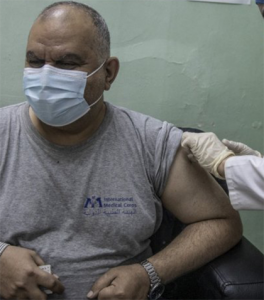Calls for migrants, refugees to be included in vaccination programs
Governments around the globe should not forget migrants and refugees as the battle against COVID-19 enters the vaccination phase, according to international aid agencies.
World Health Organisation Chief Tedros Adhanom Ghebreyesus says prospects for equitable vaccine distribution are at ‘serious risk’.
 The world is on the brink of a “catastrophic moral failure” over COVID-19 vaccine distribution, the head of the World Health Organisation (WHO) warned as he urged countries and manufacturers to share doses more fairly across countries.
The world is on the brink of a “catastrophic moral failure” over COVID-19 vaccine distribution, the head of the World Health Organisation (WHO) warned as he urged countries and manufacturers to share doses more fairly across countries.
Mr Ghebreyesus said that prospects for equitable distribution are at “serious risk” just as vaccine-sharing scheme COVAX aims to start distributing inoculations next month.
COVAX is a WHO-led initiative that aims to provide COVID-19 vaccines to poor countries.
Mr Ghebreyesus said 44 bilateral deals were signed last year and at least 12 have already been signed this year.
“This could delay COVAX deliveries and create exactly the scenario COVAX was designed to avoid, with hoarding, a chaotic market, an uncoordinated response, and continued social and economic disruption,” he said.
Such a “me-first approach” left the world’s poorest and most vulnerable at risk, he said at the opening of the body’s annual Executive Board meeting in a virtual format.
“Ultimately these actions will only prolong the pandemic.”
Mr Ghebreyesus cited as an example of inequality that more than 39 million doses of vaccine have been administered in 49 higher-income countries whereas just 25 doses had been given in one poor country.
Earlier this month, he appealed to drug makers and wealthier countries to “stop making bilateral deals,” saying they hurt the UN-backed effort to widen access.
A report released in early December by the NGO, the People’s Vaccine Alliance warned that as much as 90 per cent of the population in dozens of poorer countries will miss out on the coronavirus vaccine.
In its report, the alliance said rich countries have hoarded enough doses to vaccinate their entire populations nearly three times over, leaving some 67 poor countries with only enough to vaccinate one in 10 people
Meanwhile the International Organisation for Migration said that as hopes of a vaccine rise, a second wave of the virus is producing infection rates up to ten times higher in parts of Europe than those of last year.
The IOM’s health chief says a combination of harsh winter conditions and seasonal flu is likely to put a massive strain on already-overburdened health services.
“This is bad news for the tens of thousands of migrants in the region,” said IOM’s Health Advisor Dr Jaime Calderon.
“All too often, migrants encounter obstacles in accessing health services – due to language and cultural barriers, fees they cannot afford, and lack of inclusive health policies,” he said.
IOM’s Dr Calderon urged governments to include migrants in public health strategies and vaccination plans.
“Vaccines are among our most critical and cost-effective tools to prevent outbreaks and keep communities safe and healthy,” he said.
“For everyone to thrive, countries must intensify efforts to ensure that no one is left behind and all migrants – no matter their legal status – have access to the life-saving benefits of vaccines.”
Meanwhile, Jordan has become one of the world’s first countries to start COVID-19 vaccinations for refugees, UNHCR has reported
“Once again Jordan has shown exemplary leadership and solidarity in hosting refugees. The country has included refugees in every aspect of the public health response to the pandemic, including the national vaccination campaign, proving how it should be done if we are to keep everyone safe,” said UN High Commissioner for Refugees Filippo Grandi.
“I appeal to all countries to follow suit and include refugees in their vaccination drives on par with nationals and in line with COVAX allocation principles,” he said.
“The vast majority of the world’s refugees are hosted in low- and middle-income countries. The international community must do more to support host governments with access to the vaccines. Global and equitable access is what will ultimately protect lives and stem the pandemic,” Mr Grandi said.












